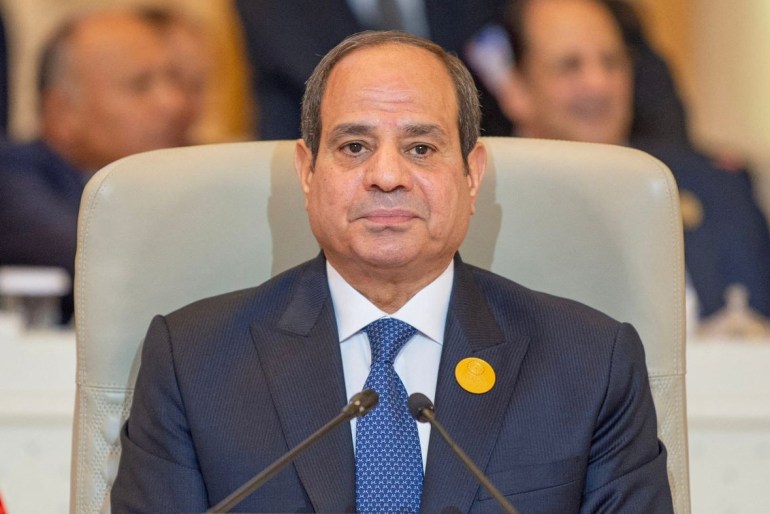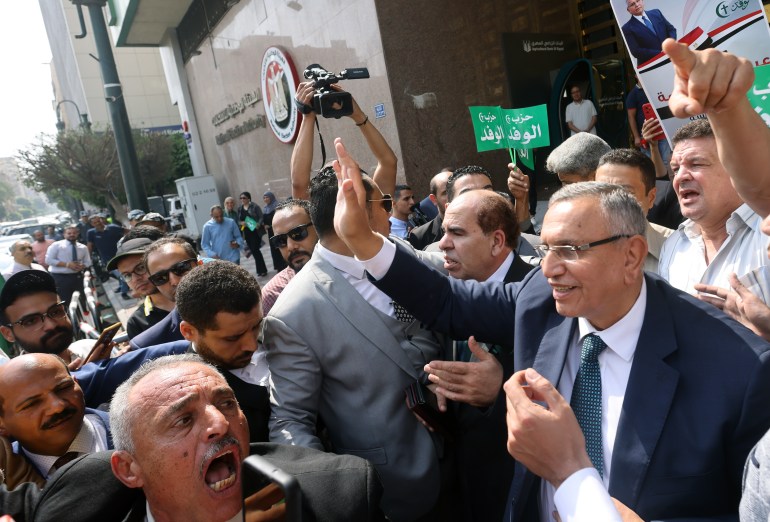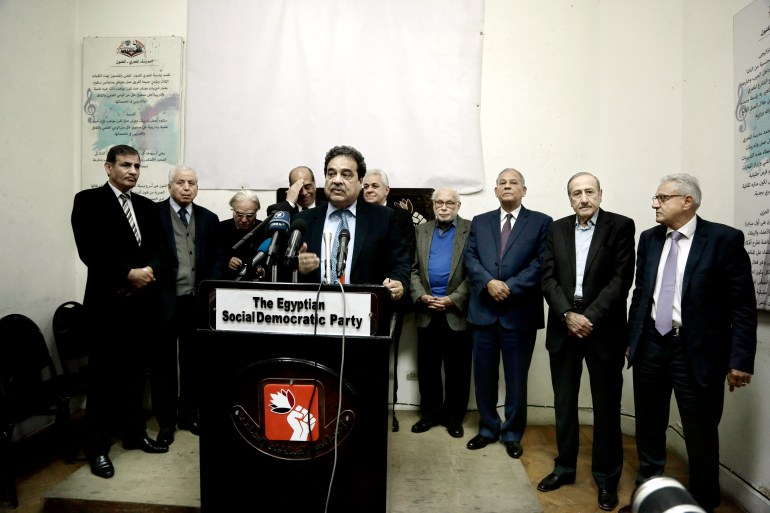A decade after Egypt’s President Abdel Fattah el-Sisi came to power in a coup, he’s preparing to run for a third term.
The former defence minister is the clear favourite despite overseeing a rapidly declining economy and facing criticism from Western partners and rights groups over his human rights record.
In October, el-Sisi announced his bid following a three-day conference called “Story of a Homeland”. The elections are scheduled to take place over three days starting on December 10.
Egyptians living abroad can vote at 121 Egyptian embassies and consulates around the world from December 1 to 3.
Here is all you need to know about the coming elections.
Who is running?
The incumbent, President el-Sisi, is running as an independent candidate for the third time.
He served as Egypt’s defence minister from 2012 to 2013 and as deputy prime minister from 2013 to 2014. During those two roles, he was a general in the Egyptian army, serving as director of military intelligence from 2010.
El-Sisi resigned from the army in 2014 to stand for election, as he was barred from doing so as a member of the armed forces.

Three candidates are facing off against el-Sisi in this election.
The first is Abdel Sanad Yamama who heads the liberal Wafd (Delegation) Party and who has been running on the motto “Save Egypt”.
Yamama has said that he wants to improve Egypt’s economy and education and to safeguard the legal system from what he described as interference from the executive branch.

The second candidate is Hazem Omar who announced his bid in October. Omar is the head of the Republican People’s Party and a wealthy businessman who oversees a tourism company. He previously served in the government as the Chairman of the Foreign Relations Committee in Egypt’s Senate.
In addition, Omar is perceived to be a supporter of el-Sisi as he has not disagreed in public with the president during the last 10 years.

The last candidate is Farid Zahran who heads the Egyptian Social Democratic Party.
A member of Egypt’s leftist student movement in the 1970s, Zahran now promises to improve the quality of living for all Egyptians if he is elected.
The 66-year-old is also perceived to be close to el-Sisi and his security services. He even helped form el-Sisi’s cabinet after the 2013 coup against Egypt’s democratically elected President Mohamad Morsi, who was from the Muslim Brotherhood.

Will el-Sisi win?
As in previous elections, el-Sisi is expected to win by a solid margin.
He is perceived as having brought stability to Egypt after a few years of turbulence. But during his 10-year rule, his government has been accused of severely restricting press freedom, jailing critics and intimidating any possible candidates who were perceived to be a real threat to his rule.
The trend has continued during this campaign. In May 2023, a left-wing candidate Ahmad Tantawi announced his intention to run for president. According to Egyptian law, he first needed to secure either 25,000 signatures from 15 different governorates or an endorsement from 20 parliamentarians.
Tantawi tried to get the former but, he said, Egypt’s security forces harassed and intimidated him into withdrawing his name from the election last October. Commentators and experts have questioned whether Tantawi had a real chance of beating el-Sisi.
Nancy Okail, president and CEO of the Center for International Policy, a progressive nonprofit in Washington, DC, said el-Sisi could still be embarrassed if there is a low voter turnout.
“That’s why the usual combination of intimidation and bribing tactics are at play: Threatening school teachers and civil workers to come out to vote or else they will face consequences, giving out cash to people and providing transportation to bus people in big numbers to show up and dance at the polls,” she told Al Jazeera.
Why an election now?
Egypt’s presidential election was originally scheduled to take place in April 2024, until el-Sisi moved it up.
Mostafa al-A’sar, a non-resident fellow with the Tahrir Institute for Middle East Policy (TIMEP), a non-profit that centres on Arab voices in policy debates, said el-Sisi wanted to be re-elected before imposing potentially crippling austerity measures.
He explained that el-Sisi wants the legitimacy of a new electoral victory to justify acting against any dissent that may erupt from his economic policies.
“He’s doing this election to restore his legitimacy,” he told Al Jazeera.
During the last 10 years, el-Sisi has borrowed from foreign creditors to finance several projects such as a new administrative capital. His spending spree has quadrupled Egypt’s foreign debt, which needs more than $28bn to meet repayments next year only. The IMF had also issued a loan of $3bn to Egypt, but the programme has gone off track due to el-Sisi’s reluctance to sell off state assets and float an already devalued currency.
Okail believes the main audience for the election is Western states and senior officers in the army who would like reassurance that el-Sisi is secure.
“The harsh crackdown serves this objective,” she said, “It’s mainly for an external audience.”


